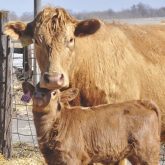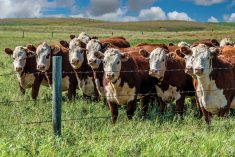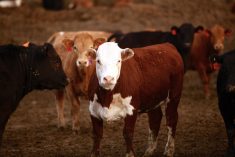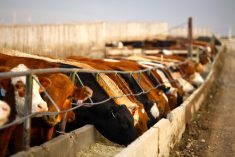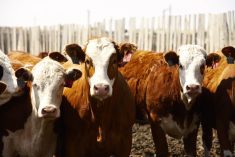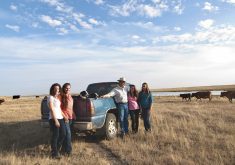Updated Mar. 16, 2015 for clarification: This story states below (paragraph six) that the indicators for the verified sustainable initiative are scored from 1 (poor) to 5 (excellent). In fact, McDonald’s Canada is still developing the terms that go with the scoring system. In its presentation at the Alberta Beef Industry Conference, an example was given for the scoring for participation in the pilot project. In that example, a score of 5 was awarded for “excellence level,” a score of 3 for “achievement level,” and a score of 1 for “entry level.”
McDonald’s has put its foot on the gas, and is revving up its verified sustainable beef pilot.
The largest buyer of Canadian beef has developed a set of 40 ‘indicators’ to assess sustainability; created a scoring system to grade ranches, feedlots and others in the beef value chain; and chosen an American verification company to oversee the process.
But producers shouldn’t be worried by these moves, McDonald’s sustainability manager for Canada said at the recent Alberta Beef Industry Conference.

“This is not a certification regime — this is a verification opportunity,” said Jeffrey Fitzpatrick-Stilwell. “It’s about information sharing, not policing. It’s about producers demonstrating how they meet the criteria. It’s not an audit and it’s not pass/fail.”
Since picking Canada for its global sustainable beef pilot last year, the fast-food giant has given few details on how that will work — even though it has promised to start using sustainable beef in 2016.
But in consultation with an advisory board from across the Canadian beef sector, the company has developed ways — dubbed ‘indicators’ — to score practices on animal care, environmental stewardship, and food safety. Not every indicator is applicable to all segments of the value chain, but each one comes with a scoring system ranging from 1 (poor) to 5 (excellent). Each aligns with principles set out by the Canadian Roundtable for Sustainable Beef and the Global Roundtable on Sustainable Beef.
Read Also

Farming Smarter receives financial boost from Alberta government for potato research
Farming Smarter near Lethbridge got a boost to its research equipment, thanks to the Alberta government’s increase in funding for research associations.
- More from the Alberta Farmer: Just what exactly does ‘sustainable beef’ mean?
Producers wanted
It has also chosen a third-party verifier, Colorado-based Where Food Comes From, Inc., a global leader in agricultural verification. That company will collect information that producers will provide in order to show how they meet the indicators, along with animal identification data that will track cattle from birth to burger.
The program will utilize both an enhanced version of the Verified Beef Program and the Beef InfoXchange System (BIXS), which is currently being revamped after the Canadian Cattlemen’s Association partnered with Edmonton-based ViewTrak Technologies.
McDonald’s is now looking for cow-calf producers, backgrounders, and feedlot operators interested in participating in the pilot, said Fitzpatrick-Stilwell and Michele Banik-Rake, director of sustainability for McDonald’s worldwide supply chain.
“We need to get out on farms to establish our baselines,” said Banik-Rake, who also spoke at the Alberta Beef Industry Conference.
As they have said throughout the process, the McDonald’s officials stressed that they view beef production in Canada as sustainable and that their program is about documenting that in order to assuage consumer concerns.
“You wouldn’t be in business if you weren’t operating in a sustainable way,” Fitzpatrick-Stilwell told conference attendees. “But customers don’t trust us to tell them that. They don’t trust Cargill to tell them. So we need to develop some way of verifying the good work that is already happening.”
Credibility key
But the program has to be meaningful for consumers, said Banik-Rake.
“If we start going out on farms and everyone’s a 5, we will not have a credible process,” she said. “That will not be credible in a consumer’s mind or an NGO’s mind. Conversely, if we go out and everyone is a 1, we’ll need to address that as well. Our next step is to get feedback on farms and do some of these verifications.”
They also said the sustainable beef program won’t see cattle segregated at the packers. When it announced its sustainable beef program a year ago, McDonald’s only promised to “begin purchasing” such beef in 2016. The company is committed to meeting that target, and if things were to go south in Canada, it would look elsewhere for sustainable beef, said Banik-Rake.
“When we hit our 2016 target — and we firmly believe we will — we’ll set a target for a quantity,” she said.
Using BIXS will give the company a good handle on how much verified sustainable beef is being used in the 70 million pounds of hamburger patties produced at Cargill’s Spruce Grove plant west of Edmonton.
“We’ll be able to do a pretty good estimate of how many verified cattle arrived at the facility (Cargill’s High River slaughter plant) that day, how much was processed, and how much ended up at Spruce Grove to be turned into McDonald’s burgers that day,” said Fitzpatrick-Stilwell.
“We won’t be able to say next year that this hamburger is a sustainable hamburger, but we will be able to say that X per cent of all the meat that was processed in the Spruce Grove facility came from verified sustainable sources,” said Banik-Rake. “And our plan, over time, would be to continue to grow that number.”
The process
Ranchers who sign up for the pilot will begin by filling out a self-assessment online. That will be followed by a ‘pre-verification’ stage in which the verifier will see if there are any areas for improvement. The third stage will be the official verification.
The process will be confidential and participants will receive benchmark data from the program.
“What we will do with this information is share information about why somebody is a 4 with other ranchers in Canada,” said Banik-Rake. “This is about providing information so you can continue to improve.”
About two dozen producers have already signed up for this stage of the pilot program. Following this stage, there will be workshops to explore lessons learned, before moving on to a second group of producers.
Getting the process right and ensuring it works for everyone in the beef chain is the top priority at this point, the two McDonald’s officials said.
“We have no target in mind for numbers or per cents,” said Banik-Rake. “If it means that it’s a small percentage (of verified sustainable beef) that we start to buy in 2016, so be it. We all agree that it was done in the right way.”
Producers who have questions or who would like to participate in the pilot can contact Jeffrey Fitzpatrick-Stilwell by calling 416-450-1484 or by sending him an email here.





